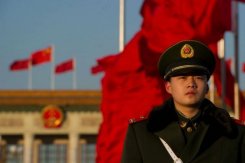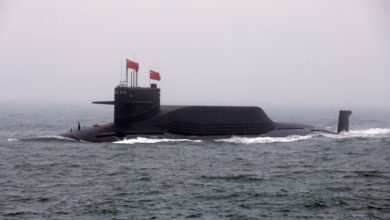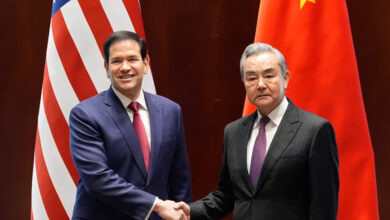
Three people were sentenced to death Monday over a suicide car crash in Beijing's symbolic heart Tiananmen Square, state-run media said, in China's latest move against militants from restive, mainly Muslim Xinjiang.
One other person was given life in prison for the "violent terrorist attack" that killed two tourists last October, said state broadcaster China Central Television (CCTV), citing the Intermediate People's Court in the Xinjiang capital Urumqi.
The three sentenced to death were convicted of "organising and leading a terrorist group and endangering public security with dangerous methods", according to the official Xinhua news agency.
Four other people were given prison terms ranging from five to 20 years, Xinhua said.
Both it and CCTV identified several of the accused with names that sounded Uighur, the largest ethnic group in the violence-racked region.
All three people in the car — a man, his wife and his mother — died in the attack, which saw their vehicle plough into crowds of tourists, killing two and wounding 40 other people before bursting into flames, authorities said at the time.
CCTV showed the eight accused — two of them women — sitting in a vast courtroom as prosecutors presented the evidence against them. An unidentified woman wearing a headscarf in the audience wiped tears from her eyes.
For the first time security camera video was broadcast of the attack, showing a white SUV turning onto a pavement at high speed and barrelling into crowds of pedestrians, who scattered before it.
Prosecutors also displayed several weapons, including a large sword.
The symbolism of the attack was unmistakable — Tiananmen Square lies at the centre of Beijing and is bounded to the north by the former imperial complex known as the Forbidden City with a giant portrait of Communist China's founding father Mao Zedong hanging on its gate.
The incident was one of several violent attacks that have rocked China in recent months, and which Beijing has blamed on separatists from Xinjiang.
The far-western region is the resource-rich homeland of the country's mostly Muslim Uighur minority, and periodically sees ethnic tensions and discontent with the government burst out into violence.
In March a horrific knife assault at a railway station in the southern city of Kunming left 29 dead and 143 wounded.
Last month 39 people were killed, along with four attackers, and more than 90 wounded when attackers threw explosives and ploughed two off-road vehicles through a crowd at an Urumqi market.
Exile groups say cultural oppression and intrusive security measures imposed by the Chinese government are the main causes of tension, along with immigration by China's Han ethnic majority, which they say has led to decades of discrimination and economic inequality.
Beijing says the government has helped improve living standards in the region and developed its economy.
In connection with the October crash, Xinjiang prosecutors said in a statement last month that eight people were suspected of organising, leading and participating in crimes of a terrorist organisation, as well as endangering public safety.
No details of what roles the eight accused played in the attack were immediately available.
Chinese courts, which are controlled by the ruling Communist Party and have a near-perfect conviction rate, frequently impose death sentences for terrorism offences.
Earlier this month nine people were condemned to death in Xinjiang on terrorism-related charges.
Those sentencings were part of a crackdown that comes after Beijing vowed a year-long campaign against terrorism in the wake of the Urumqi market attack.
Authorities in Xinjiang also sentenced 55 people for offences including terrorism at a mass sentencing in May in a stadium attended by about 7,000 people. Hundreds of others are reported to have been detained in recent weeks.
The crackdown includes efforts to curb the spread of violent and "terror-related" video and audio recordings.
Last month Xinjiang police detained more than 200 people who "have circulated videos promoting terrorism through the Internet and on portable devices", according to a report in the state-run Global Times.
Chinese authorities have long said that overseas-based terror groups including the Turkestan Islamic Party (TIP) and East Turkestan Islamic Movement (ETIM), influenced by Al-Qaeda, have inspired and even orchestrated violence in China from Central Asia, which borders Xinjiang.
Some experts question the influence of the TIP, a shadowy organisation that has released videos praising attacks in China but has yet to explicitly claim responsibility for them.
Information about the vast region is difficult to verify independently, with foreign and local journalists subject to heavy restrictions.




